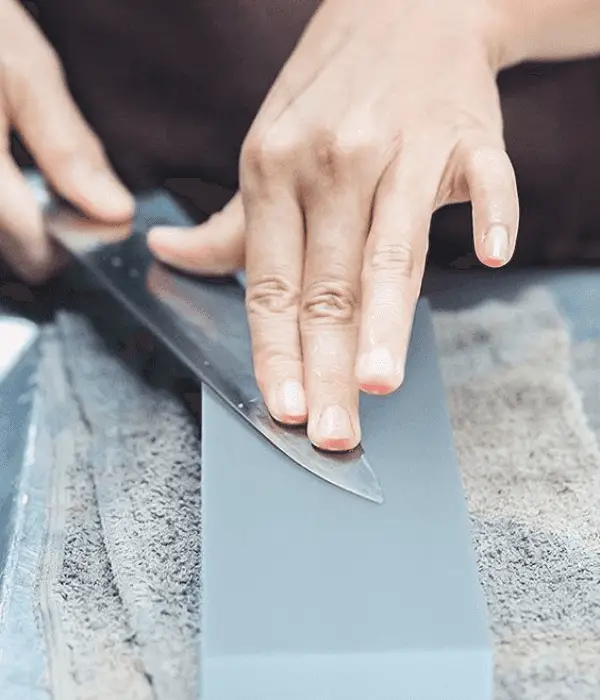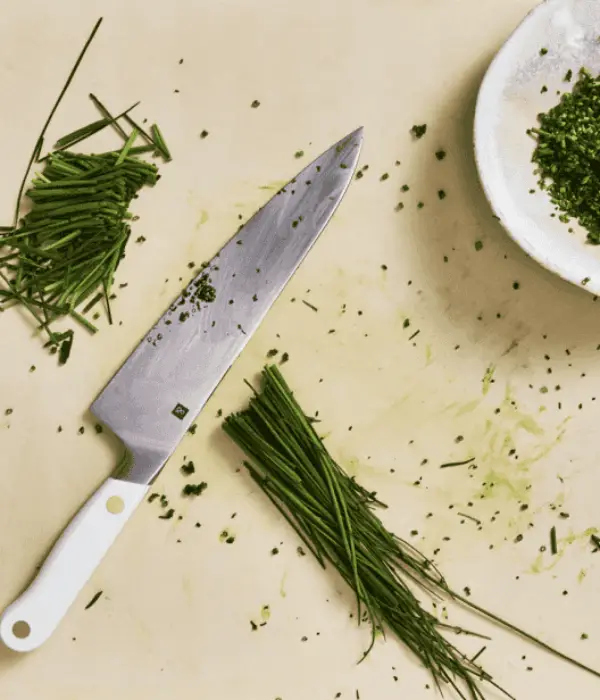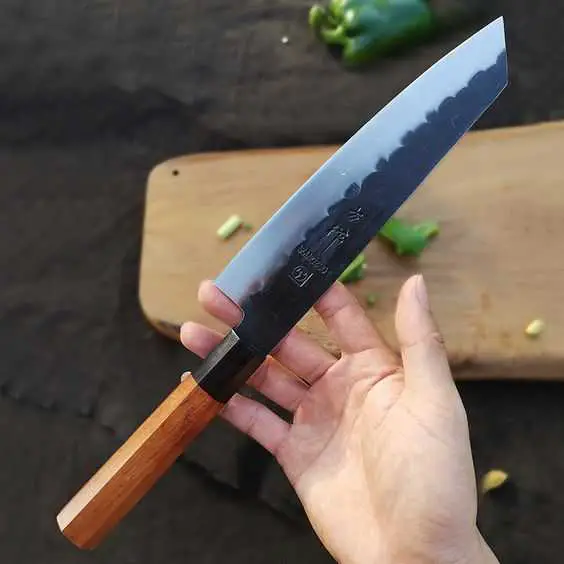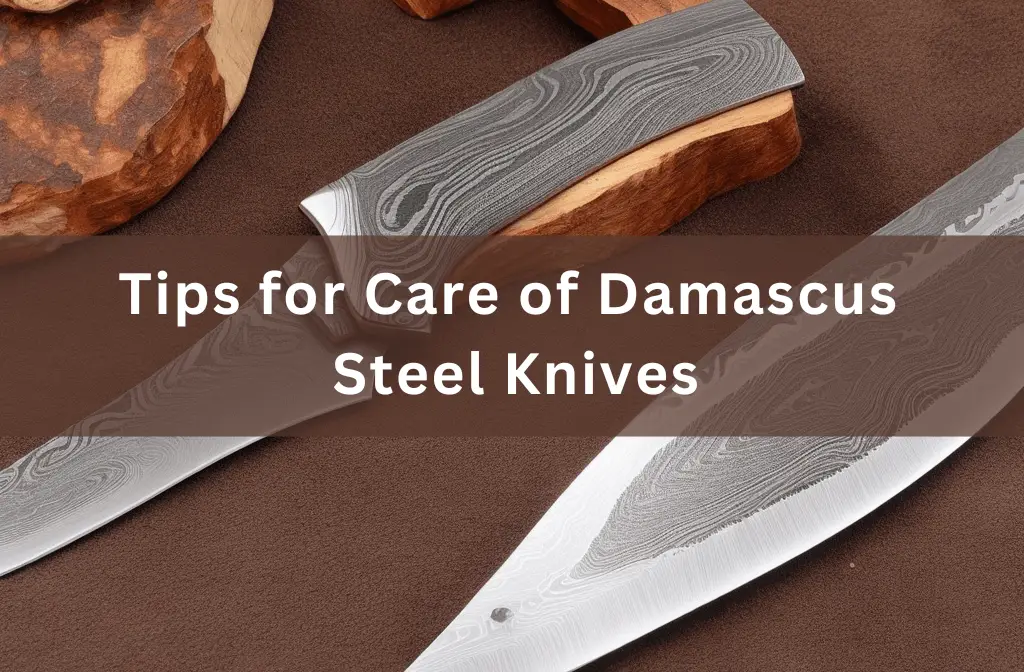
Care of Damascus Steel Knives is like taking a special journey through time and skill. When you have a Damascus steel knife, it’s not just for cutting – it’s like having a work of art that’s also really strong. These knives are famous for their cool patterns and how tough they are. So, looking after them needs careful care.
This guide’ll explore how to keep your Damascus steel knives awesome. From understanding their beauty to learning how to clean, store, and take care of them, we’ll give you important tips. It doesn’t matter if you’re a cooking expert or just starting out, these pages will help you learn how to look after your steel knives the right way.
Imagine holding a knife that’s not just for cutting, but also a masterpiece of skill and history. That’s what a Damascus steel knife is. These knives have fancy patterns and are really strong. But to keep them amazing, you need to take care of them in a special way.
Caring for a Damascus steel knife is like taking care of something important and tough. It’s not just a tool – it’s like having a cool piece of art. In this guide, we’ll show you how to clean these knives without hurting them, how to keep them dry, how to store them safely, and even how to make them sharp again. Whether you’re great at cooking or just getting started, these tips will help you keep your special knife looking fantastic and working perfectly.
Let’s dive into the world of Damascus Steel and learn how to take care of these awesome knives.
What Makes Damascus Steel Special?
Damascus steel isn’t just any metal; it’s a blend of craftsmanship and tradition. It’s famous for its wavy pattern that looks like flowing water. Some say it got its name from Damascus, Syria, where these knives were traded long ago. Others think the word “damas” in Arabic, which means water, is a nod to how the metal looks.
Damascus steel is made by combining different metals to create a strong blade. This kind of steel has been around for a very long time and is still highly sought after today. Its unique pattern and sharpness make it stand out.
How to take care of Damascus Steel Knives?
Your Damascus steel knife is more than a tool; it’s a masterpiece that deserves respect and care. By mastering these techniques, you’re not merely maintaining a possession – you’re preserving a legacy. Embrace the journey of caring for Damascus steel knives, and let your culinary adventures be guided by precision, durability, and timeless beauty.
Cleaning and Maintenance: The Foundation of Care of Damascus Steel Knives
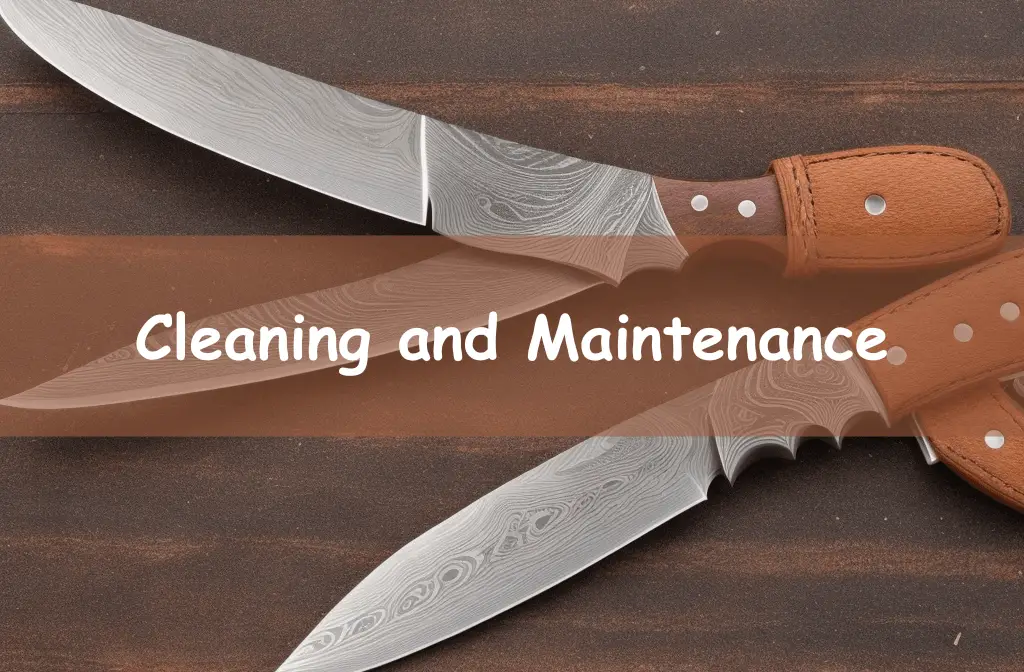
Proper Cleaning Techniques
To ensure the longevity of your Damascus steel knife’s beauty, durability, and sharpness, following proper cleaning techniques is paramount:
- Clean the blade after each use: Removing food residue and debris promptly maintains not only the knife’s appearance but also your health. Neglecting cleaning can lead to harmful bacteria buildup.
- Dry the blade thoroughly: Prevent rust and corrosion by drying the blade completely after washing. Leaving it damp invites damage and compromises performance.
Avoiding Harsh Chemicals and Abrasives
The road to preservation requires steering clear of damaging elements:
- Don’t use harsh chemicals: Bleach, ammonia, and strong substances can irreparably harm your knife’s blade and handle, potentially erasing the distinctive pattern of Damascus steel.
- Avoid abrasives: Steel wool, sandpaper, or harsh chemicals should never touch your Damascus steel knife. These materials scratch and dull the blade, potentially ruining its sharpness and unique pattern.
Keeping the Blade Dry: The Key to Longevity
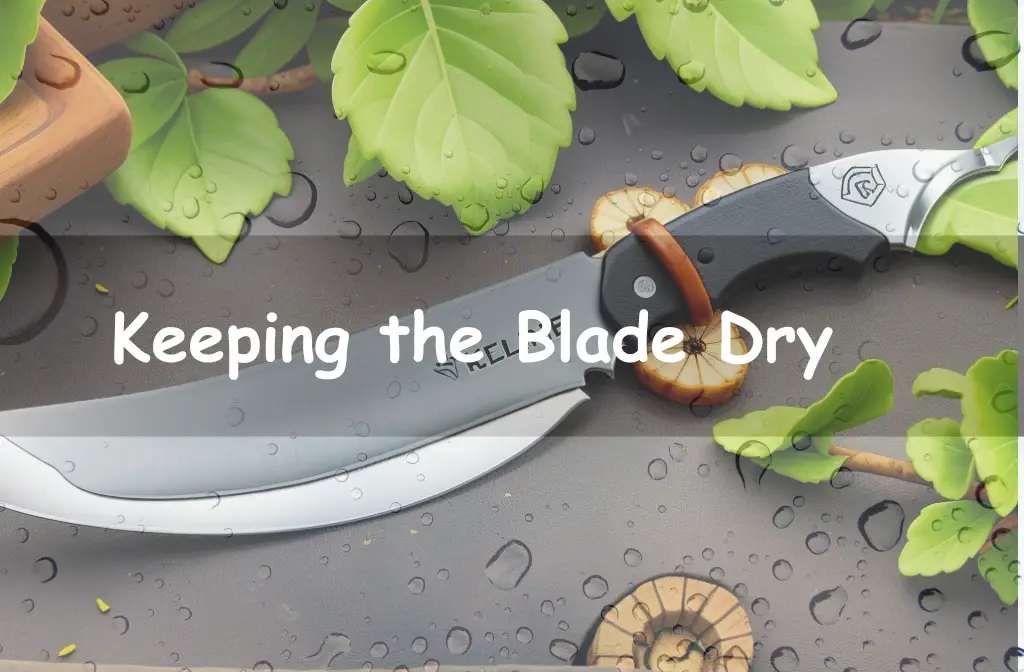
Proper Storage
Storing your Damascus steel knife correctly plays a crucial role in its maintenance:
- Use a knife block or sheath: A knife block secures the knife, protecting the blade and preventing accidents during storage.
- Store the knife separately: Shield your knife from scratches by storing it separately from other utensils, maintaining its sharpness and performance.
Wipe Down the Blade Regularly
Regularly wiping down your Damascus steel knife is a simple yet effective method:
- Apply a light coating of oil or wax: Wipe down the blade regularly with a product specifically designed for knives, like Renaissance wax, mineral oil, coconut oil, or beeswax.
Sharpening and Honing: Techniques for Precision
The Difference between Sharpening and Honing
Understanding the distinction between the two is vital:
- Sharpening: Involves grinding the blade’s edge to create a new, sharp edge.
- Honing: Uses a honing steel to realign and refine the blade’s edge, preserving its sharpness.
Choosing the Right Sharpening Tools: Care of Damascus Steel Knives
Selecting the proper tools ensures precision:
- Sharpening stones: High-quality stones, with grit sizes between 1000 and 3000, are effective for sharpening Damascus steel knives.
- Electric sharpeners: Efficient but caution is needed to prevent overheating and potential blade damage.
How to Sharpen Knives and Hone the Blade
Follow these steps for optimal results: Care of Damascus Steel Knives:
- Prepare the sharpening stone: Soak the stone for at least 10 minutes in water.
- Sharpen the blade: Hold the blade at a 20-degree angle and move it back and forth across the stone.
- Hone the blade: Hold the blade at a steeper angle (around 25-30 degrees) and move it back and forth across the honing stone.
Recommended Frequency
Maintain the blade’s precision with regular Care of Damascus Steel Knives:
- Sharpening: As needed, depending on use and sharpness.
- Honing: Regularly, once a week for heavy use and once a month for occasional use.
Prevention of Rust and Corrosion: Shielding Your Knife
Understanding the Causes
Know what leads to rust and corrosion: Care of Damascus Steel Knives
- Moisture: The primary cause of damage.
- Harsh elements: Salt, acids, and chemicals contribute to corrosion.
Applying Oil or Wax for Protection
Provide a protective shield for your knife:
- Apply a light coating of oil: Use products like renaissance wax, mineral oil, or beeswax after each use and before storage.
Avoiding Exposure: The Key to Preservation
Keeping the Knife Dry
Prevent moisture from causing harm:
- Avoid exposing the knife: Keep it dry and ensure thorough drying after use.
- Stay away from harsh elements: Store the knife in a cool, dry place to thwart rust and corrosion.
Insights from Seasoned Experts
Gleaning insights from seasoned experts bolsters your care approach. Here’s their collective wisdom for Care of Damascus Steel Knives:
- Preserving Patterns: Steer clear of abrasive cleaning methods. Vigorous scrubbing can erase the very patterns that define Damascus steel’s allure. Choose soft cleaning implements to honor its unique aesthetics.
- Mindful Usage: The knife’s visual appeal can diminish when exposed to overly acidic or humid environments. Safeguard it from such conditions to cherish its enduring beauty.
- Thoughtful Storage: Opt for a controlled indoor environment devoid of extreme conditions for your Damascus steel knife. By adopting this practice and employing suitable storage solutions, you guarantee its lasting charm.
- Natural Handle Caution: If your Damascus knife features natural handle materials, exercise caution when considering dehumidifier bars. These bars can potentially compromise the integrity of these materials.
In the grand tapestry of culinary tools, a Damascus steel knife is more than just an instrument; it’s a conduit to tradition and creativity. Through meticulous Care of Damascus Steel Knives, you’re not merely sustaining an object; you’re honoring the legacy.
As you navigate the intricate landscape of preparing meals with your Damascus steel knife, each cut becomes a chapter in the story of craftsmanship. Care of Damascus Steel Knives, and will reciprocate with undying elegance and performance, enhancing your culinary journey in profound ways.
Wrapping Up!
In the end, a Care of Damascus Steel Knives isn’t just a tool – it’s a connection to the past and a piece of art. By taking good care of it, you’re not just maintaining an object; you’re keeping a tradition alive. So, as you use your knife, remember that every cut tells a story of craftsmanship. Care for it, and it will keep serving you with its beauty and usefulness, making your cooking adventures even more special.
What Makes Damascus Steel Special?
Damascus steel isn't your ordinary metal – it's a blend of history and craftsmanship. Renowned for its flowing water-like wavy pattern, it's a marriage of art and tradition. Some say the name comes from Damascus, Syria, where these knives were traded, while others believe it's due to the resemblance of the metal to water. Made by combining different metals, Damascus steel boasts exceptional strength and a unique pattern that sets it apart.
Why Care of Damascus Steel Knives Important?
Caring for your Damascus steel knife isn't just about maintaining a tool – it's about honoring tradition and craftsmanship. By preserving its beauty and performance, you're keeping a legacy alive and enhancing your culinary journey.
How Does Caring for a Damascus Steel Knife Enhance Culinary Adventures?
A Damascus steel knife isn't merely a utensil; it's a connection to the past and a piece of art. By taking good care of it, you're honoring the craft and tradition. With proper care, your knife will reciprocate with enduring elegance and performance, making every cut a part of your culinary story.
How do I clean my Damascus steel knife properly?
Cleaning your Damascus steel knife involves rinsing it under warm water to remove loose debris, then washing it gently with mild dish soap and a soCleaning your Damascus steel knife involves rinsing it under warm water to remove loose debris, then washing it gently with mild dish soap and a soft cloth or sponge. Avoid abrasive materials that could scratch the blade's surface.ft cloth or sponge. Avoid abrasive materials that could scratch the blade's surface.
Can I use harsh chemicals to clean my Damascus steel knife?
It's strongly advised to avoid harsh chemicals like bleach and ammonia. These substances can damage the blade and remove the unique pattern of Damascus steel, diminishing its appearance and value.
What should I avoid using to clean my Damascus steel knife?
Avoid using abrasive materials such as steel wool, sandpaper, or harsh chemicals. These can scratch the blade's surface, dull its edge, and compromise its overall performance.
How should I dry my Damascus steel knife after cleaning?
After cleaning, dry your knife with a clean, dry cloth or paper towel. Ensure both the blade and handle are thoroughly dried to prevent rust and discoloration.

